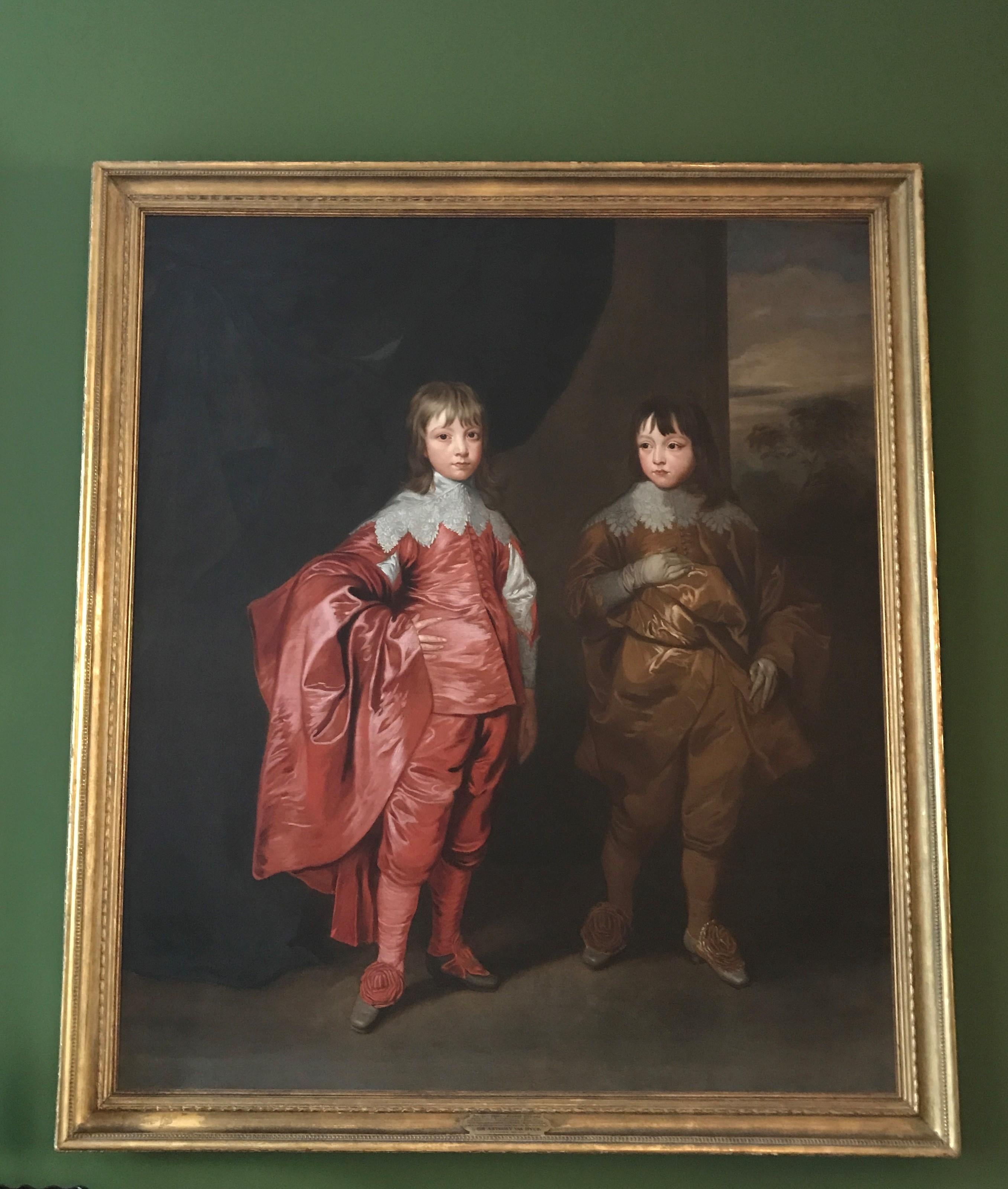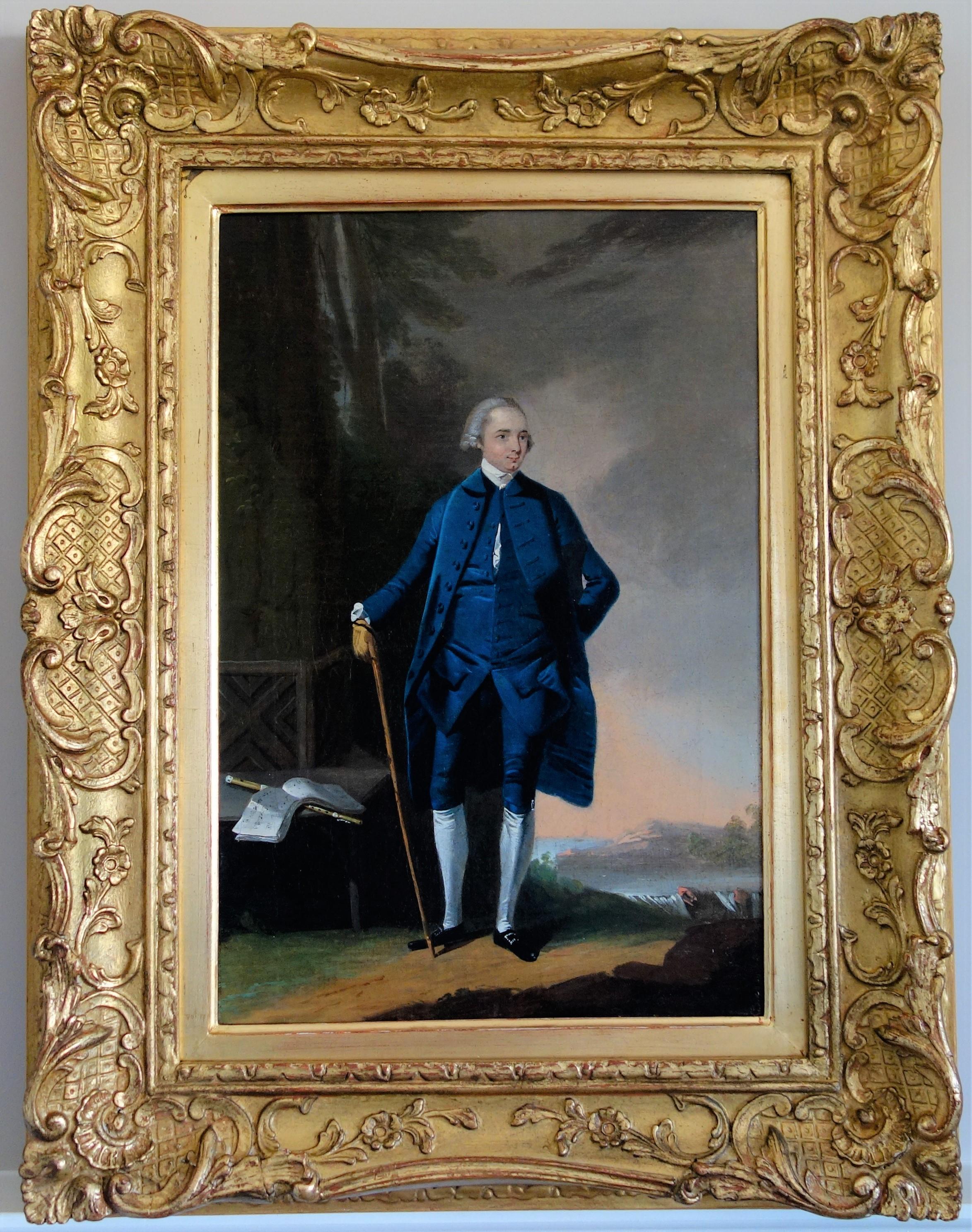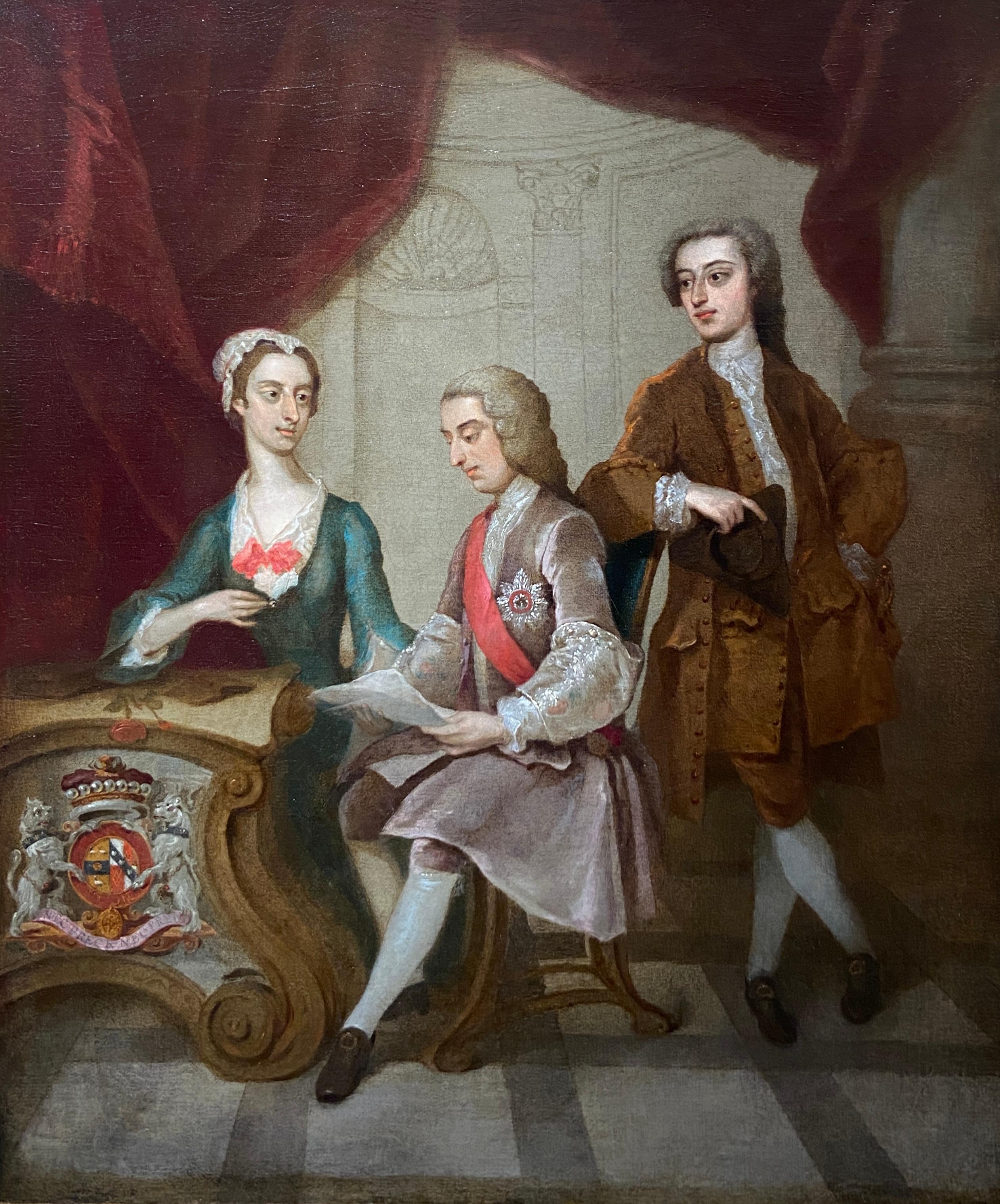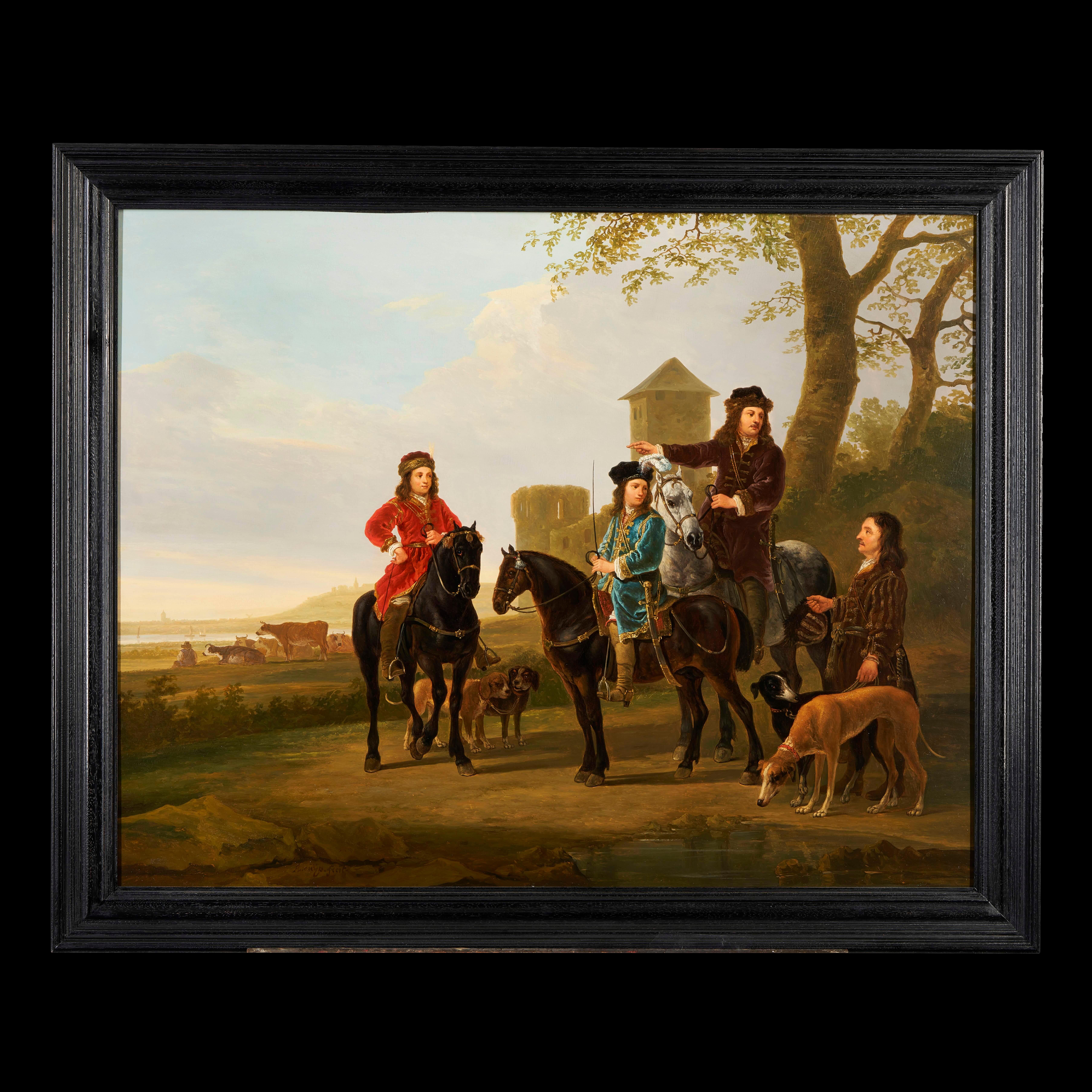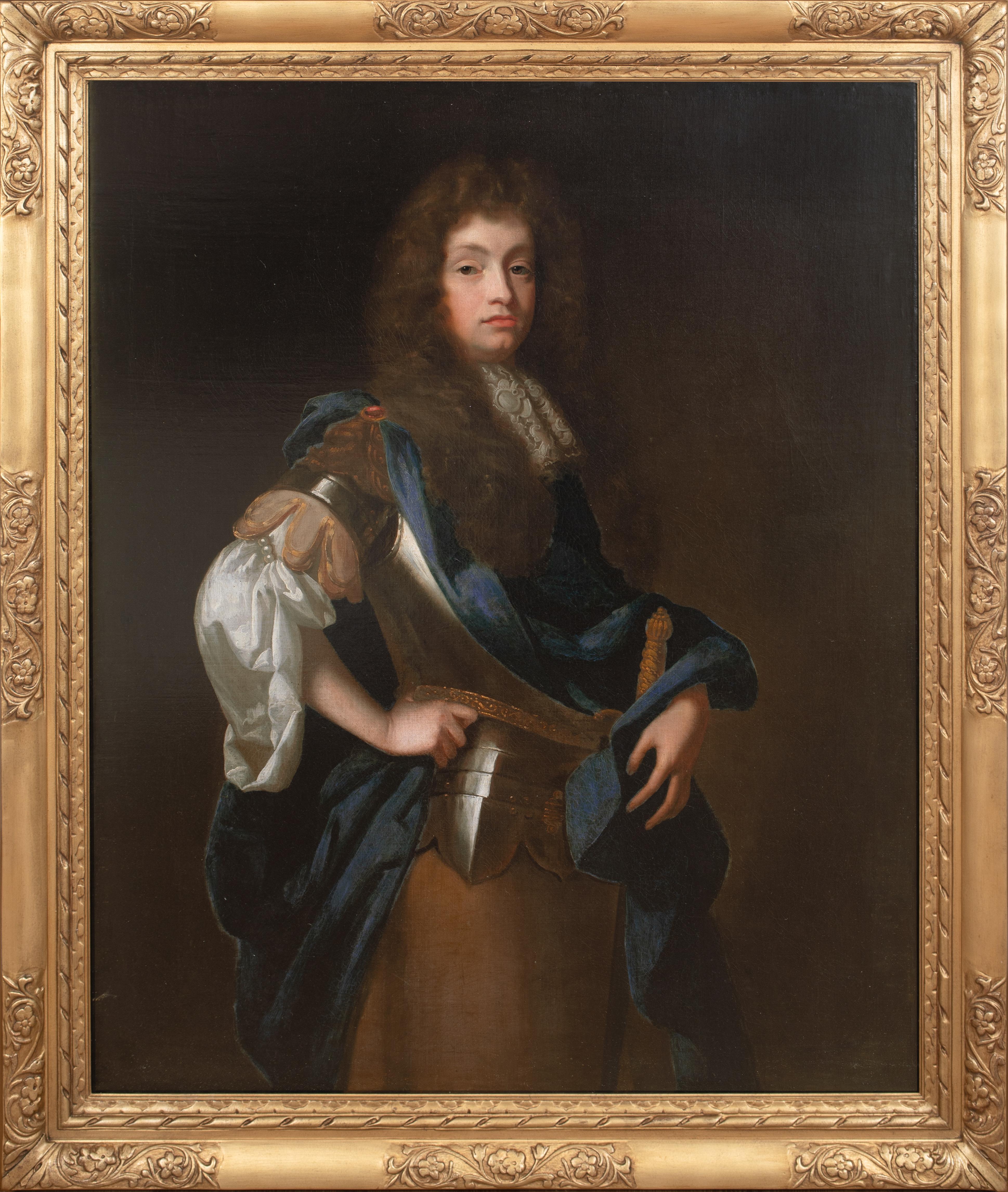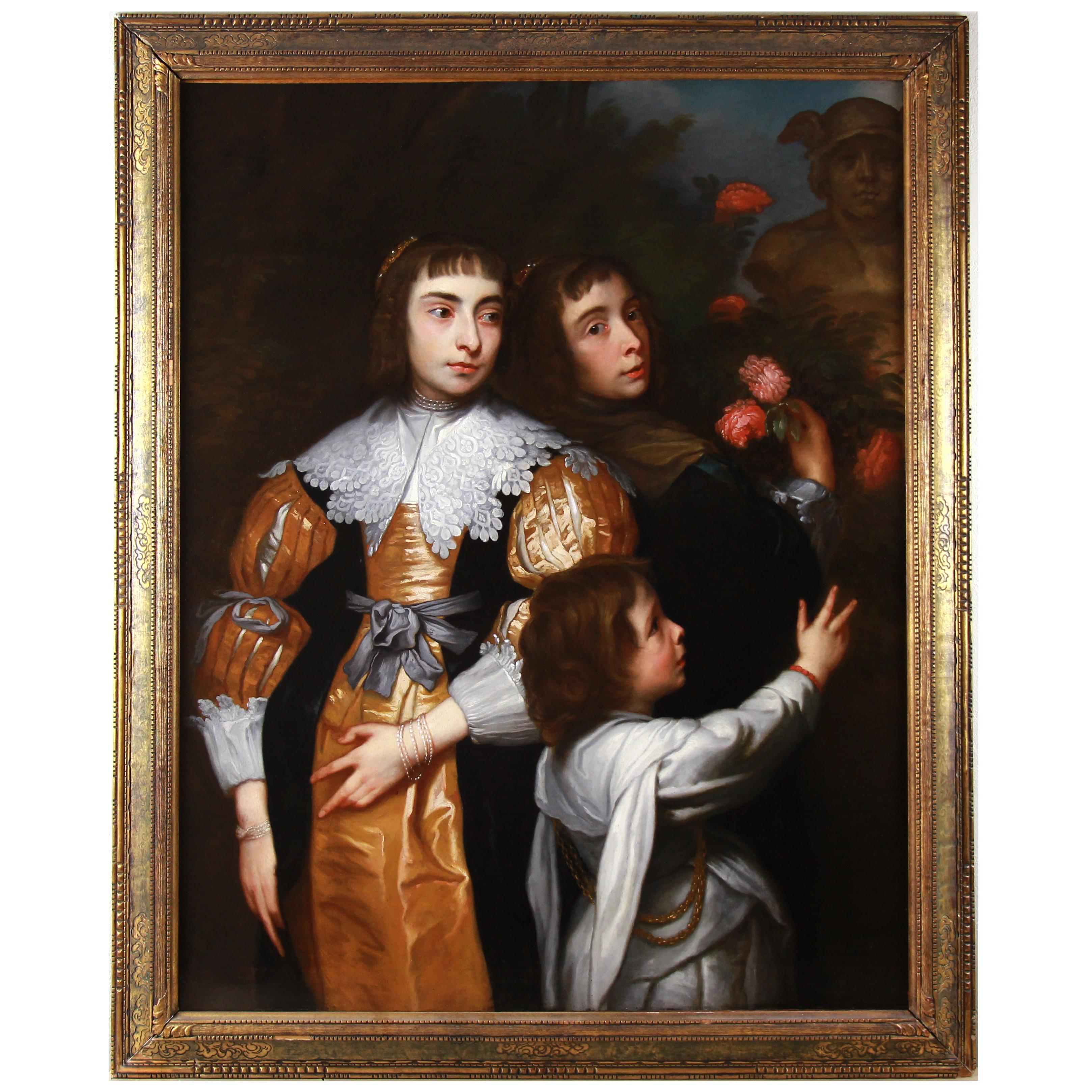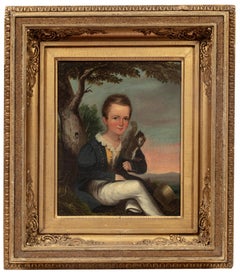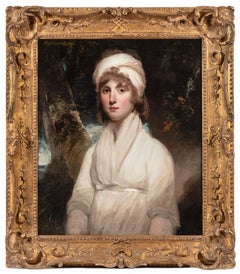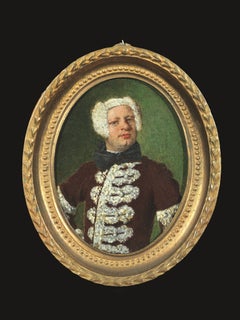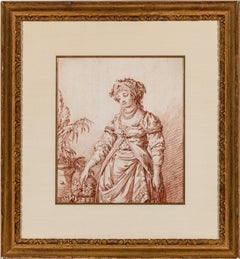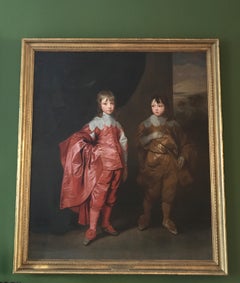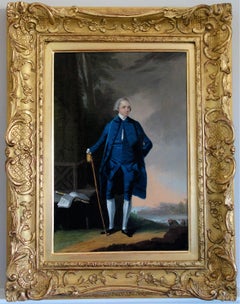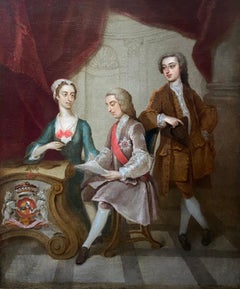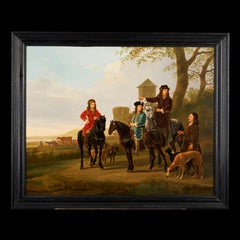Items Similar to Portrait of George and Edward Finch-Hatton in Van Dyck Dress
Want more images or videos?
Request additional images or videos from the seller
1 of 9
David MartinPortrait of George and Edward Finch-Hatton in Van Dyck Dress
$28,750
£21,848.06
€25,145.45
CA$41,142.71
A$45,204.05
CHF 23,311.44
MX$541,590.26
NOK 295,983.53
SEK 277,768.51
DKK 187,801.32
About the Item
Appointed Portrait Painter to the Prince of Wales in Scotland in 1785, David Martin was the leading Scottish portrait painter of his generation. The artist is best known in the United States for his portrait of Benjamin Franklin, which is in the White House collection, Washington, D.C. The sitters depicted in this double portrait were the sons of the British diplomat Edward Finch-Hatton. George (1747-1823), later of Eastwell Park, Kent, is shown seated, reading an ancient charter or medieval manuscript. (His eldest son succeeded to the Earldom of Winchelsea and Nottingham, from which the present painting descends). George's younger brother, Edward (1755-1841), shown standing, was a barrister-at-law and Bencher of the Inner Temple, London. Both men are wearing Van Dyck costume, thereby indicating their antiquarian enthusiasm as collectors.
- Creator:David Martin (1736-1798, British)
- Dimensions:Height: 56.5 in (143.51 cm)Width: 67 in (170.18 cm)
- Medium:
- Period:
- Condition:Excellent.
- Gallery Location:New York, NY
- Reference Number:1stDibs: G12061210239
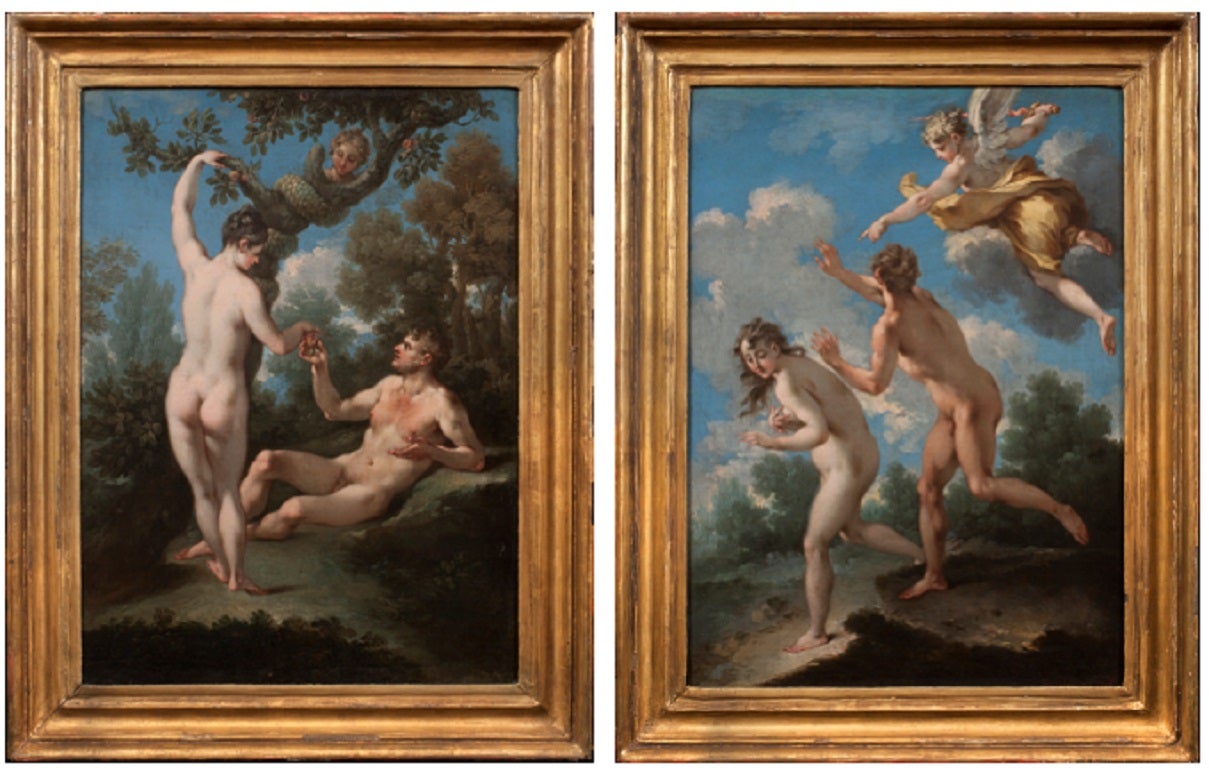
About the Seller
5.0
Recognized Seller
These prestigious sellers are industry leaders and represent the highest echelon for item quality and design.
Established in 1997
1stDibs seller since 2012
24 sales on 1stDibs
Typical response time: 11 hours
- ShippingRetrieving quote...Shipping from: Tuxedo Park, NY
- Return Policy
Authenticity Guarantee
In the unlikely event there’s an issue with an item’s authenticity, contact us within 1 year for a full refund. DetailsMoney-Back Guarantee
If your item is not as described, is damaged in transit, or does not arrive, contact us within 7 days for a full refund. Details24-Hour Cancellation
You have a 24-hour grace period in which to reconsider your purchase, with no questions asked.Vetted Professional Sellers
Our world-class sellers must adhere to strict standards for service and quality, maintaining the integrity of our listings.Price-Match Guarantee
If you find that a seller listed the same item for a lower price elsewhere, we’ll match it.Trusted Global Delivery
Our best-in-class carrier network provides specialized shipping options worldwide, including custom delivery.More From This Seller
View AllPortrait of a Boy with a Squirrel
Located in New York, NY
Provenance: Lewis J. Ruskin, Arizona, 1958–1981; thence by descent to the present owner.
This charming portrait of a young boy with his pet squirrel is a newly-discovered work by G...
Category
Mid-19th Century Portrait Paintings
Materials
Canvas, Oil
Portrait of Laura Keppel, later Lady Southampton
By Sir John Hoppner
Located in New York, NY
Inscribed, upper left: “Miss Laura Keppel”
Provenance: Commissioned from the artist and by descent in the Keppel family estate, Lexham Hall, Norfolk, to:
Major Bertram William Arnol...
Category
18th Century Paintings
Materials
Canvas, Oil
Portrait of a Bewigged Gentleman
By Vittore Ghislandi
Located in New York, NY
Vittore Ghislandi, called Fra Galgario
Provenance:
Robert L. and Bertina Suida Manning, New York, ca. 1966-1996
Private Collection, USA
Exhibited:
“Eighteenth Century European Pai...
Category
18th Century Baroque Paintings
Materials
Copper
Woman in Fantasy Costume (pair)
By Jean Baptist Le Prince
Located in New York, NY
The pair consists of the present work and an engraving after it by the hand of Giles DeMarteau (Liège 1722 – 1776 Paris) titled Woman in Fantasy Costume, after Jean Baptiste Le Prince, and measuring, 10 ⅜ x 8 ⅝ inches (26.5 x 22 cm).
DeMarteau's engraving is inscribed at the bottom:
Le Prince inv. del. / Demarteau sc. / A Paris ches Demarteau Graveur du Roi, rue de la Pelterie à la Cloche...
Category
18th Century Drawings and Watercolor Paintings
Materials
Paper, Chalk, Engraving
Portrait of a Man
Located in New York, NY
Provenance:
with Leo Blumenreich and Julius Böhler, Munich, 1924
Dr. Frederic Goldstein Oppenheimer (1881-1963), San Antonio, Texas; by whom given to:
Abraham M. Adler, New York, until 1985; thence by descent to the present owners
While old inscriptions on the verso of this panel propose its author to be Hans Holbein and the sitter Sir John More—a lawyer, judge, and the father of Sir Thomas More—this fine portrait has long been recognized to be by a Flemish hand. Max Friedländer gave the painting to Bernard van Orley (1487/1491 – 1541) in 1924, but did not include it in the volume dedicated to the artist in his Early Netherlandish Paintings...
Category
16th Century Old Masters Portrait Paintings
Materials
Oil, Panel
$52,500
Two Scenes of Diana and Actaeon (a pair)
By Giovanni Battista Viola
Located in New York, NY
Provenance:
Robert L. and Bertina Suida Manning, New York, until 1996
Private Collection, USA
Giovanni Battista Viola was born in Bologna a...
Category
17th Century Baroque Landscape Paintings
Materials
Copper
You May Also Like
Double Portrait Oil Painting Brothers George, 2nd Duke Buckingham & Lord Francis
By (After) Anthony Van Dyck
Located in London, GB
Aftrer Anthony VAN DYCK - maybe Studio (1599, Antwerp – 1641, London) Flemish
Double Portrait of George Villiers, 2nd Duke of Buckingham (1628-1687) & Lord Francis Villiers (1629-1648)
Oil on Canvas
170 x 147 cm
Anthony Van Dyck (1599-1641)
No painter has done more to define an era than Anthony van Dyck. He spent only seven and a half years of his short life (1599- 1641) in England. He grew up in Antwerp, where his precocious talent was recognised by Peter Paul Rubens, the greatest painter of his age. He worked in Rubens’s studio and imitated his style as a religious artist, painting biblical scenes redolent of the lush piety of the counter-reformation. But soon he was on the move. In 1620, he visited London for a few months, long enough to paint a history picture, The Continence of Scipio, for the royal favourite, George Villiers, Marquess of Buckingham, and a portrait of his other English patron, the great art collector, Thomas Howard, 2nd Earl of Arundel.
After a stint in Italy, making imposing portraits of the wealthy aristocracy and sketching and copying works by Titian, he returned to the Spanish Netherlands in 1627, becoming court artist to Archduchess Isabella before departing for The Hague in 1631 to paint the Dutch ruler Frederick Henry, Prince of Orange. Charles I’s invitation in 1632 led Van Dyck back to London where he was knighted, paid an annual salary of £200 and installed in a house in Blackfriars with a special jetty at which the royal barge might tie up when the King was visiting his studio. By this time Van Dyck was recognised as the leading court painter in Europe, with Velazquez at the court of Philip IV of Spain his only rival. He also excelled as a superbly observant painter of children and dogs.
Van Dyck’s notoriety in depicting children led to the introduction of groups of children without their parents as a new genre into English painting (amongst other new genres).
For the next 300 years, Van Dyck was the major influence on English portraiture. Nearly all the great 18th Century portraitists, from Pompeo Batoni and Allan Ramsay to Thomas Gainsborough and Joshua Reynolds, copied Van Dyck’s costumes, poses and compositions.
George Duke of Buckingham & his brother Francis Villiers
Painted in 1635, this double portrait was originally commissioned by Charles I, who raised the two brothers after their father, George Villiers, was assassinated in 1628. Together with their sister, Lady Mary Villiers, they enjoyed the King’s favour absolutely. Francis whose absolute ‘inimitable handsomeness’ was noted by Marvell (who was killed in a skirmish near Kingston upon Thames). The young duke who commanded a regiment of horse at the Battle of Worcester, remained closely associated with Charles II, held a number of high offices after the Restoration and was one of the most cynical and brilliant members of the King’s entourage, immortalised as ‘Zimri’ in Dryden’s Absalom and Achitopbel. As a young man he had sold his father’s great collection of pictures in the Spanish Netherlands, many of them to the Archduke Leopold Willhelm.
Painted for Charles I and placed near the portrait of their sister in the Gallery at St James’ Palace. The handling of both costumes is very rich, and the heads are very carefully and sensitively worked. That of the younger boy in particular is more solidly built up than the lower part of the figure. A preparatory drawing for the younger boy is in the British Museum.
There are copies at, e.g., Highclere Castle...
Category
17th Century Old Masters Portrait Paintings
Materials
Oil
18th century portrait of the German Flautist and composer Johann Joachim Quantz
By Arthur Devis
Located in Bath, Somerset
Portrait of Johann Quantz (1697-1773), flautist and composer, wearing a blue velvet coat, waistcoat and breeches, standing in a garden landscape with ...
Category
18th Century English School Portrait Paintings
Materials
Canvas, Oil
$14,785 Sale Price
20% Off
William, 1st Viscount Bateman and Family
Located in London, GB
Oil on canvas
Image size: 24 x 18 1/2 inches (61 x 47 cm)
Gilded wood framed
Provenance
Estate of Judge Davis Norton and Florence Edelstein.
William Bateman was a British Whig politician who sat in the House of Commons between 1721 and 1734. He was made Knight Companion of the Order of the Bath...
Category
Early 18th Century Figurative Paintings
Materials
Canvas, Oil
Portrait of Cornelis and Michiel Pompe van Meerdervoort with Their Tutor
By Aelbert Cuyp
Located in Stoke, Hampshire
Attributed to Aelbert Cuyp (1620-1691)
An Equestrian Portrait of Cornelis (1639–1680) and Michiel Pompe van Meerdervoort (1638–1653) with Their Tutor and Coachman
Signed 'A. Cuyp. fe...
Category
17th Century Old Masters Landscape Paintings
Materials
Oil
$29,416 Sale Price
40% Off
Portrait Of Richard Jones, 1st Earl Of Ranelagh, 17th Century SIR PETER LELY
By Sir Peter Lely
Located in Blackwater, GB
Portrait Traditionally Identified as Richard Jones, 1st Earl Of Ranelagh, 17th Century
School Of Sir Peter Lely (1618-1680)
Large 17th Century Portrait believed to be Rochard Jones...
Category
17th Century Portrait Paintings
Materials
Oil, Canvas
$9,857 Sale Price
20% Off
Oil On Canvas Family Portrait After Sir Anthony Van Dyck ca 1870
By Anthony van Dyck
Located in Gavere, BE
"Oil On Canvas Family Portrait After Sir Anthony Van Dyck"
After Sir Anthony van Dyck (Flemish painter, 1599-1641), Group of three young girls with a bust of Mercury Oil on canvas (doubled),
probably end 19th century, with French wax seal...
Category
1870s Baroque Portrait Paintings
Materials
Gold Leaf
More Ways To Browse
The Finch
Benjamin Franklin
Antique Barrister
Edward Martin
Impressionist Oil Paintings Paris
Large English Landscape Oil Painting
Monochromatic Art
River Thames
Impressionist City
Rural Landscape Painting
Water Ripple
Desert Painting
Modern Original Oil Paintings
Oil Can
Oil Cans
Outsider Artist
Montmartre Paris
Pastoral Landscapes
